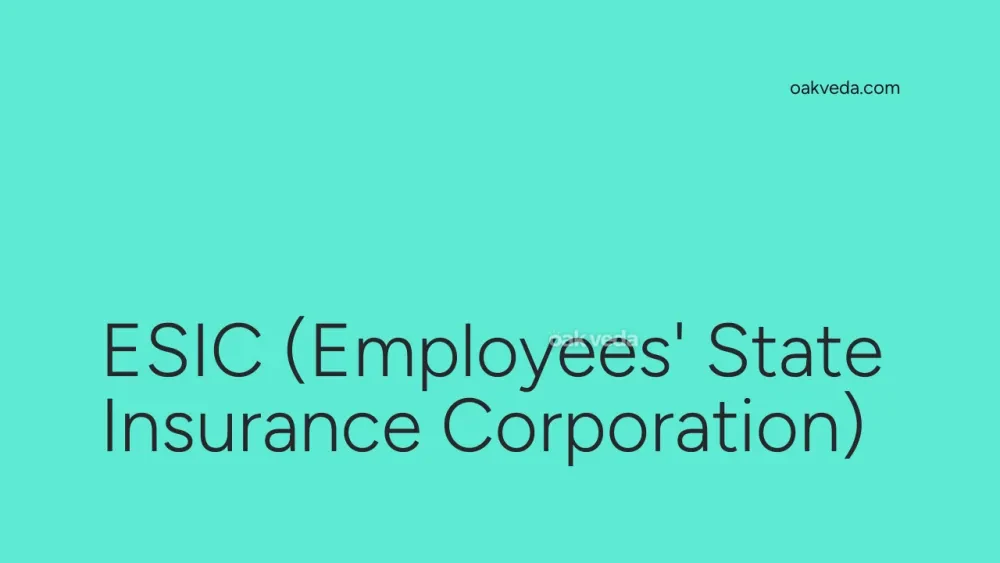
What is the Full Form of ESIC?
The full form of ESIC is Employees' State Insurance Corporation. This organization plays a crucial role in providing social security and healthcare benefits to Indian workers and their families.
What is Employees' State Insurance Corporation?
The Employees' State Insurance Corporation (ESIC) is a statutory body established under the Employees' State Insurance Act of 1948. It is responsible for administering the Employees' State Insurance (ESI) scheme, which aims to provide comprehensive social security benefits to workers in the organized sector.
Origin and Development of ESIC
The ESIC was founded in 1952 as a result of the Employees' State Insurance Act, 1948. This legislation was enacted to address the growing need for social security among India's workforce. Over the years, ESIC has expanded its reach and services, adapting to the changing needs of the Indian labor market.
How does ESIC work?
ESIC operates on a contributory basis, with both employers and employees making regular contributions to the scheme. The corporation manages these funds to provide various benefits to insured persons and their families. ESIC works in collaboration with state governments to implement the ESI scheme effectively.
Functions of ESIC
The primary functions of ESIC include:
- Administering the ESI scheme
- Collecting contributions from employers and employees
- Providing medical care and treatment to insured persons
- Disbursing cash benefits for various contingencies
- Maintaining and upgrading ESI hospitals and dispensaries
- Conducting medical research and training programs
Applications of ESIC
ESIC's services apply to various aspects of workers' lives:
- Healthcare: Providing medical care through a network of hospitals and clinics
- Financial Support: Offering cash benefits during illness, maternity, and disability
- Preventive Care: Conducting health check-ups and awareness programs
- Rehabilitation: Assisting workers in returning to work after injuries or illnesses
Features of ESIC
Key features of the Employees' State Insurance Corporation include:
- Wide Coverage: Applies to establishments with 10 or more employees
- Comprehensive Benefits: Offers medical, sickness, maternity, and disability benefits
- Extensive Network: Operates numerous hospitals, dispensaries, and branch offices across India
- Self-Financing: Funded through contributions from employers and employees
- Autonomous Body: Functions as an independent organization under the Ministry of Labour and Employment
Benefits of ESIC
ESIC provides numerous benefits to insured workers and their families:
- Medical Benefits: Free medical care at ESI hospitals and clinics
- Sickness Benefit: Cash allowance during periods of certified sickness
- Maternity Benefit: Paid leave and medical care for expectant mothers
- Disablement Benefit: Compensation for work-related injuries or occupational diseases
- Dependent Benefit: Financial support to the family in case of an insured person's death
- Unemployment Allowance: Temporary financial assistance for involuntary unemployment
Limitations or Challenges of ESIC
Despite its significant contributions, ESIC faces several challenges:
- Infrastructure Constraints: Some ESI hospitals and clinics struggle with inadequate facilities
- Awareness Issues: Many eligible workers are unaware of their rights and benefits under the scheme
- Administrative Hurdles: Delays in claim processing and benefit disbursement can occur
- Coverage Limitations: The scheme doesn't cover all sectors of the workforce, particularly informal workers
Future Developments in ESIC
ESIC is continuously evolving to better serve its beneficiaries:
- Digital Transformation: Implementing online services for easier access and claim processing
- Expanding Coverage: Efforts to include more workers from various sectors
- Improving Healthcare Quality: Upgrading medical facilities and services
- Enhancing Transparency: Implementing measures to reduce fraud and improve accountability
- Skill Development: Introducing programs to help injured workers acquire new skills
FAQs on ESIC Full Form
-
What is the wage ceiling for ESIC coverage? As of 2023, the wage ceiling for ESIC coverage is ₹21,000 per month.
-
Who is eligible for ESIC benefits? Employees earning up to ₹21,000 per month in establishments with 10 or more workers are eligible for ESIC benefits.
-
What is the contribution rate for ESIC? The current contribution rate is 3.25% of wages for employers and 0.75% for employees.
-
Can ESIC benefits be availed after retirement? Retired insured persons can continue to receive medical benefits by paying a nominal contribution.
-
Is ESIC mandatory for all companies? ESIC is mandatory for establishments with 10 or more employees, except in certain exempt categories.
In conclusion, the Employees' State Insurance Corporation (ESIC) plays a vital role in providing social security to millions of Indian workers. By offering a range of benefits and continuously adapting to changing needs, ESIC contributes significantly to the well-being of the country's workforce. As it addresses current challenges and embraces future developments, ESIC remains a cornerstone of India's social security system.
You may be interested in:
- HIV (Human Immunodeficiency Virus): Full Form Explained
- AmEx (American Express Company): Full Form Explained
- PDA (Personal Digital Assistant) Full Form
- SKU (Stock Keeping Unit): Full Form and Meaning
- PWD (Public Works Department): Full Form and Functions
- ADCB (Abu Dhabi Commercial Bank): Full Form Explained

